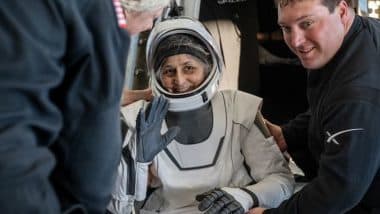There was a time when one could only imagine visiting space, that too only if you were an astronaut. Now? Times have changed. There are possible ways you can travel to space and even have sex there with your partner. But not without a clear cut waiver. Those fortunate newlyweds may need to sign a disclaimer before partaking in any extraterrestrial consummation, a new report says. Although there is little research on microgravity sex, a recent article cautions there could be serious health concerns if a pregnancy develops, including the possibility of defects in embryos formed in space or soon after. Weed Will Soon be Grown in Space to Study Effects of Microgravity and Benefits of Medicinal Use of Marijuana.
How Does Microgravity Work?
Microgravity sees persons or objects appear to be weightless. When astronauts and items float in space, one can observe the consequences of microgravity. There are additional methods to experience microgravity. Microgravity is the state in which gravity appears to be very small (the prefix "micro-" stands for "very small"). Astronauts can float within their spaceship or outside during a spacewalk in microgravity. Moving heavy stuff gets much simpler in such an condition. Astronauts, for instance, can merely use their fingertips to manipulate machinery weighing hundreds of pounds. Although microgravity is commonly referred to as "zero gravity," this is inaccurate.
Microgravity Sex & Pregnancy
The likelihood of an ectopic pregnancy, in which the embryo attaches outside the uterus, typically in a fallopian tube, could increase as a result of microgravity conception. Prior to this week's Space Tourism Conference in Los Angeles, the authors of the research titled "Sex in Space: Consideration of uncontrolled human conception in emerging space tourism" have drawn attention to their worry. Studies on the effects of microgravity on mouse embryos have yielded mixed results, but frequently revealed a harmful influence on development. However, no research has been done on the effects of microgravity on human embryos.
"It is unrealistic to assume that all space tourism participants will abstain from sexual activities while exposed to microgravity and increased levels of ionising radiation during spaceflight," they wrote. "This raises the possibility of uncontrolled human conception in space. Potential detrimental outcomes and risks include those of a biological nature such as maternal complications related to conception and embryo, foetal, neonatal and later abnormalities," they further said.
"Our starting point was a throwaway comment about sex in space, but when we checked, we were surprised the sector has not openly considered the risks and this led to the study," said lead author David Cullen, professor of astrobiology and space biotechnology at Cranfield University. The dangers of space sex might last much beyond the actual and figurative highs of being a member of the "100-mile high club." Sperm, which takes 74 days to make, may be affected by space radiation; hence, embryos conceived in the months following landing may still be impacted. The outcomes of a NASA investigation into how microgravity affects human sperm motility are not yet known to the general public.
The authors contend that because the space tourism industry is expanding, this problem needs to be resolved right away. The team suggests that a bureaucratic approach could be the best course of action, forcing potential tourists to sign waivers prior to takeoff and possibly forbidding childbearing.
(The above story first appeared on LatestLY on Apr 27, 2023 04:39 PM IST. For more news and updates on politics, world, sports, entertainment and lifestyle, log on to our website latestly.com).












 Quickly
Quickly



















